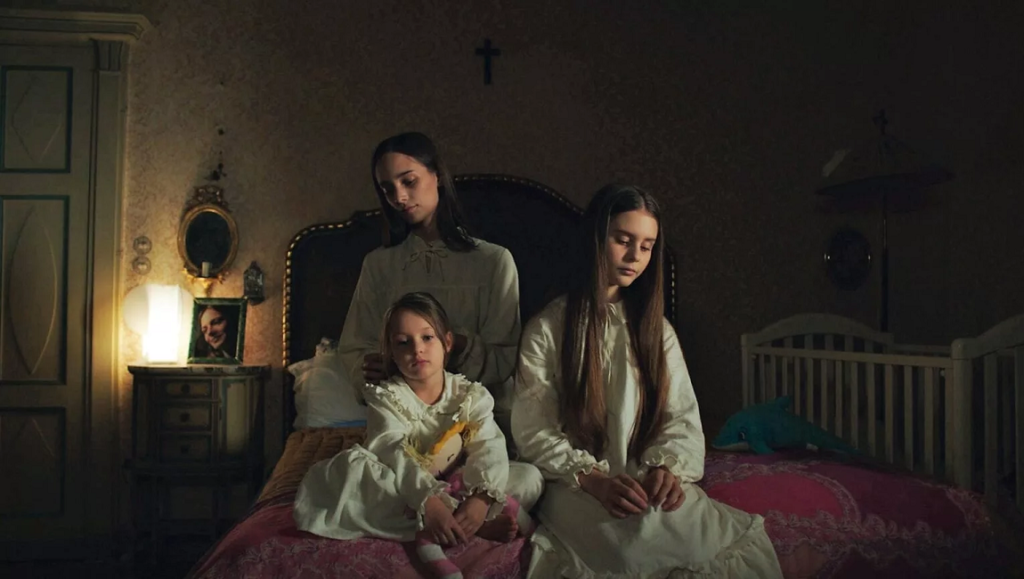It’s not quite accurate to describe Darkness as magic realism, but it’s not strictly a genre piece, either. Much like the children at the story’s center, the film is best considered a kind of chrysalis, shifting and changing shape as the narrative progresses. Directed and co-written by Emanuela Rossi, it’s a film that begins as a fable of sorts, before gradually working in an emotional realism not typically found in this kind of genre-adjacent fare. In other words, it’s a film that progresses from the vague to the specific, from the symbolic to the concrete. Darkness is a tale of three sisters: there’s Stella (Denise Tantucci), the oldest sister, who looks after middle child Luce (Gaia Bocci), and young Aria (Olimpia Tosatto), probably not much older than five. They live a sequestered existence in a dilapidated manor with their father (Valerio Binasco), who leaves each day in a hazmat suit and gas mask to roam a post-apocalyptic wasteland gathering food for his children and fighting off marauders. At least, that’s what he tells his daughters, who aren’t allowed to leave the house. The girls while away the days doing what kids do, playing dress-up and having tea parties. Only Stella is old enough to remember the “before” times, including their mother, who their father claims left the family to wander the scorched earth outside. But something here is very wrong; father is a tyrant, a religious zealot who abuses his children, leaving them alone with no food for increasingly long periods of time and sits around drinking and smoking when he bothers to be at home.
These early scenes are vaguely reminiscent of Dogtooth and Jim Mickle’s version of We Are What We Are, with a cloistered family unit cut off from society and partaking in strange rituals, like a fractured fairy tale. Father reads end-times scripture and browbeats the children, occasionally dressing them up in comically outlandish outfits so they can safely go outside (but only for a few minutes). The film changes gears when it (fairly quickly) reveals the truth, that there was no apocalyptic event and the world outside is much the same as always. After father has gone missing for several days, and fearing starvation, Stella escapes the home to find food and instead finds this truth. It’s here that Darkness leaves behind its more obvious influences and becomes something entirely different, a tale of a young woman attempting to extricate herself and her sisters from a cult. Tantucci is a remarkable performer, carrying the film on her frightfully thin shoulders. She navigates a lot of tricky emotional territory, at times relishing her position as the eldest child and father’s favorite, while also realizing that father is a monster. Early scenes of her tentatively engaging with the outside world are perfectly realized, with a mixture of terror and wide-eyed wonder. Rossi also toes a tricky line, gradually making clear that father is a sexual predator, and that he has turned his lecherous attentions from Stella to Luce, without (thankfully) actually showing any explicit molestation. Toxic masculinity as abusive cult isn’t a particularly new idea, but it bears repeating, and Rossi brings vitality to what could have been a slog of misplaced good intentions. Befitting a fairy tale, the monster can be vanquished, but Rossi ends the film on a cryptic, ambiguous note: the world these girls have escaped to might be just as frightening as the one they’ve left behind.
DIRECTOR: Emanuela Rossi; CAST: Denise Tantucci, Valerio Binasco, Gaia Bocci, Olimpia Tosatto; DISTRIBUTOR: Film Movement; STREAMING: July 28; RUNTIME: 1 hr. 28 min.
Originally published as part of Nightstream 2020 — Dispatch 3.


Comments are closed.